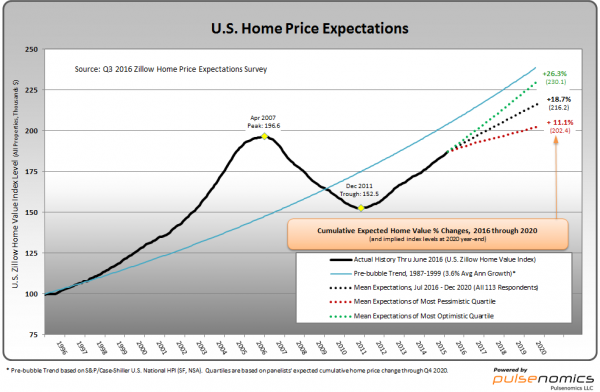On August 10, 2016, the Zillow Q3 2016 Home Price Expectations Survey results were released. This survey is done on a quarterly basis.
An excerpt from the Press Release:
Overall, the experts surveyed predict home price appreciation across the country will be up over 4 percent year-over-year by the end of 2016. They expect home prices to slow down over the next four years and by the end of 2020, they predict home prices will grow at an annual pace of just 2.9 percent."Panel-wide, the experts currently expect U.S. home values to finish 2016 with a healthy 4.5 percent year-over-year gain," said Pulsenomics founder Terry Loebs. "This projection implies a somewhat cooler, but still solid, second half of the year. Although further price moderation is expected next year, nearly 90 percent of the panel is projecting lower home value gains in 2017. The longer-run outlook for housing market performance remains steady. Overall, the expected five-year average annual growth rate for home values actually rose, albeit slightly, for the first time in three years."
–
Various Q3 2016 Zillow Home Price Expectations Survey charts are available, including that seen below:
As one can see from the above chart, the average expectation is that the residential real estate market, as depicted by the U.S. Zillow Home Value Index, will continually climb.
The detail of the Q3 2016 Home Price Expectations Survey (pdf) is interesting. Of the 100+ survey respondents, only one (of the displayed responses) forecasts a cumulative price decrease through 2020. That forecast is from Mark Hanson, who foresees a 15.58% cumulative price decrease through 2020.
The Median Cumulative Home Price Appreciation for years 2016-2020 is seen as 4.50%, 8.47%, 11.94%, 14.75%, and 18.58%, respectively.
For a variety of reasons, I continue to believe that even the most “bearish” of these forecasts (as seen in Mark Hanson’s above-referenced forecast) will prove too optimistic in hindsight. From a longer-term historical perspective, such a decline is very mild in light of the wild excesses that occurred over the “bubble” years.
I have written extensively about the residential real estate situation. For a variety of reasons, it is exceedingly complex. While many people continue to have an optimistic view regarding future residential real estate prices, in my opinion such a view is unsupported on an “all things considered” basis. Furthermore, from these price levels there exists outsized potential for a price decline of severe magnitude, unfortunately. I discussed this downside, based upon historical price activity, in the October 24, 2010 post titled “What’s Ahead For The Housing Market – A Look At The Charts.”
_____
The Special Note summarizes my overall thoughts about our economic situation
SPX at 2176.80 as this post is written

No comments:
Post a Comment